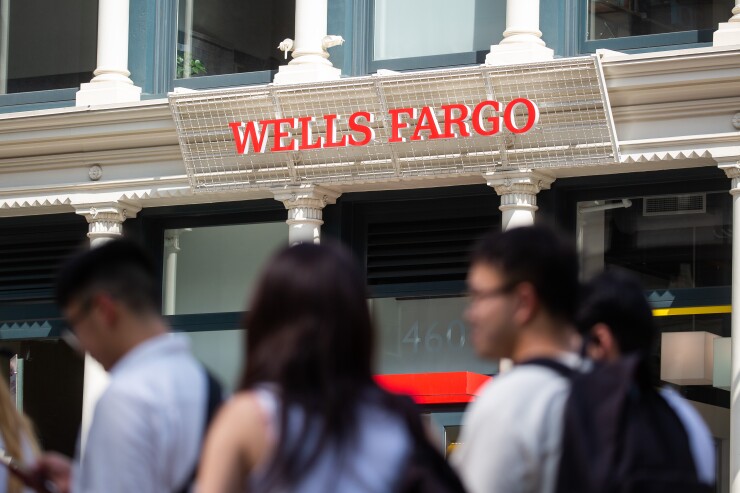
UPDATE: This article includes an analyst's comments, additional details and context.
For the second time in recent years,
The Office of the Comptroller of the Currency flagged "deficiencies" at the megabank in an enforcement action released Thursday. The action is a major setback for Wells, which was freed from
The bank's stock plunged by about 4% on Thursday afternoon after the news. Investors have been hoping that Wells CEO Charlie Scharf, who joined the bank in late 2019, will finally be able to rid the San Francisco company of its numerous regulatory troubles.
In a statement Thursday, the $1.9 trillion-asset bank said that it has been "working to address a substantial portion of what's required in the formal agreement."
"We are committed to completing the work with the same sense of urgency as our other regulatory commitments," the bank said.
The OCC, meanwhile, said that it's requiring Wells to take "comprehensive corrective actions" to ensure that it is reporting suspicious activity, in addition to performing adequate customer due diligence and customer identification. The bank, which has been shackled by an asset cap since 2018, must also take extra steps as it considers launching new products and services.
Within two months, the bank will have to submit a plan to assess any money laundering and sanctions risks tied to new products and services. In the meantime, it cannot expand into products or markets with higher risks of violations without getting an explicit non-objection from its regulators.
Among other steps, the OCC is requiring Wells to submit an action plan on how it plans to get back into compliance, including by better delineating roles and training for front-line staffers.
The OCC's order did not include the announcement of a monetary penalty.
Last month,
Scott Siefers, an analyst at Piper Sandler, wrote Thursday in a note to clients that he had hoped the bank's August 2024 disclosure to investors was merely due to a "low bar for disclosure" rather than pointing to more regulatory troubles ahead.
"Evidently, we were too optimistic," Siefers wrote. "Needless to say, an unfortunate but not shocking step back in what had otherwise been good forward progress this year on resolving regulatory concerns."
The OCC's
It stemmed from problems that regulators found in Wells' wholesale banking unit, which worked with corporate customers that had annual sales of more than $5 million. The OCC determined at the time that the bank's processes for determining whether individual customers posed money-laundering risks were ineffective.
Shortly after that enforcement action was lifted, Scharf said that the OCC's decision was evidence of the bank's progress, though he also noted that Wells was still building its risk and control infrastructure.
"While we are pleased with this action, we have a significant amount of work ahead of us and are continuing to commit the necessary resources to this effort," the CEO said in a press release at the time.
The bank
Since the most recent OCC action doesn't directly relate to retail practices, it isn't likely to "impact the prospects" for the asset cap's removal, Gerard Cassidy, an analyst at RBC Capital Markets, wrote in a note to clients.
Even so, he noted that the anti-money-laundering issues may "take time to resolve and are costly to fix," with the potential for fines ahead.
Regulators have lifted six consent orders against






